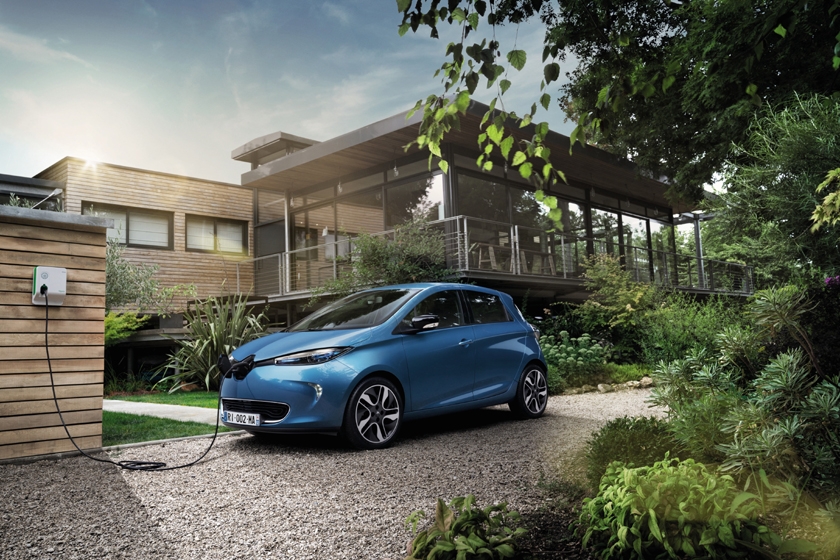New French study reveals hidden potential of electric vehicles
- Electric vehicles have lower global warming potential than combustion vehicles on their overall life-cycle. Il could still be drastically reduced depending on France’s energy choices by 2030
- Improving the environmental impacts of batteries will help meet the Paris Climate Agreement objectives
- Vehicle to grid and second life batteries will accelerate the deployment of renewables and ensure better grid stability
Brussels, 25 January 2018. In France, battery electric vehicles cause 2 to 3 times less global warming pollution than diesel and petrol vehicles over their whole life cycle, reveals a new study (1) released today by the European Climate Foundation together with French institutional actors, representatives of the automotive and electromobility industry, battery makers, the energy sector and five NGOs, including Fondation pour la Nature et l’Homme (created by Nicolas Hulot, the French Environment Minister) (2).
This advantage, the study shows, will be maintained in 2030 if the objectives of the French Energy Transition Law are achieved, and will be even greater if France extends its objectives to develop renewable energy and commits to a scenario that is 100% renewable (3).
While emissions from the transport sector continue to rise, decarbonising the transport in France but also in Europe will be key if we want to meet our Paris Climate Agreement commitments. The Clean Mobility Package, presented by the European Commission in November 2017, recognises the role of electric vehicles to meet the EU’s climate goals. This study published today confirms that electric vehicles are a good solution for the climate even taking into account emissions from the production of batteries.
The key role of batteries
40% of the greenhouse gas emissions produced by an electric vehicle occur during the battery production phase. Therefore, improving the environmental impacts of batteries, the study reveals, has a key role in decarbonising the transport sector and helping to reach the Paris Climate Agreement objectives.
In a period of major growth in the battery electric vehicle market up to 2030, the improvement of energy efficiency of production activities should enable the impact of the vehicle to be reduced by 20 to 25% up to 2030.
Improving the environmental impact of mineral extraction, developing sustainable batteries in terms of efficiency, weight and use, and promoting of recycling practices are also part of the solution.
Unleashing the batteries’ full potential
E-mobility offers a wealth of additional environmental advantages for the French electricity system, the study says:
-
The use of vehicle-to-grid services (V2G) can help integrate intermittent energies and stabilize the grid in order to phase-out fossil fuels in the French power sector, either by implementing smart charging or bilateral charges (electricity is exported from the vehicle to the grid). The technical V2G potential in France of 1.3 million vehicles (30% of the stock in 2030) is 45 GWh. Around 10% of this potential could cover the entire needs in terms of primary reserve between 6-8pm during a winter day.
-
Second-life batteries for storing electricity can compete as sustainable and convenient option for renewable energy storage. When a battery loses a quarter of its initial capacity (for example after 10 years), it can be refurbished and used as a renewable energy storage device. Renewable energy can therefore be stored when a surplus is available and then reinjected when demand is high, or it can be used for own use. If all automotive batteries entered in the French market in 2020 are used for renewable energy storage in 2030, the technical annual potential will be 8 TWh, increasing to 37 TWh in 2040 (providing there is enough renewable energy to be stored).
Quotes
Laurence Tubiana, CEO of the European Climate Foundation:
Decarbonising the transport sector is key if we want to be in line with the Paris Agreement. This study shows that electric vehicles can be deployed while respecting our climate and environmental objectives. The collaborative spirit shown throughout this project is what we need to make this ambition come true.
Jean-Philippe Hermine, Groupe Renault Environment VP:
The electromobility ecosystem is a vital lever for accelerating the energy transition and the deployment of renewables.
Pascal Canfin, Director of WWF France:
If we want to ensure a successful evolution towards 100% renewable energy, the transition of the mobility and energy sectors must occur simultaneously. Under certain conditions, the development of electric vehicles can happen without resorting to nuclear energy and can be a solution to accelerate the integration of renewables into the energy mix. That is why we support its development amongst a panel of other sustainable modes of transport.
Joseph Beretta, President of AVERE:
The electric vehicle - if well used in a meaningful decarbonised energy mix - represents a key ecological opportunity for France. Already today and even more tomorrow, driving an electric vehicle is a positive step that needs to be supported if the energy mix moves in the right direction.
Yann Laot, SAFT:
Batteries play a key role in the development of the electromobility. Recycling them can help reduce the vehicles’ environmental footprint.
Lorelei Limousin, Réseau Action Climat:
In order to have a sustainable development of electromobility, France needs to move towards 100% renewables in its energy mix by 2050. In parallel the number of vehicles must decrease and be replaced by shared modes of transport as well as other modes of transport others than cars.
Marie Chéron, Fondation pour la Nature et l’Homme:
This study is indicative of the magnitude of the changes we have to trigger. An electric car is not a conventional car. We have to consider it differently and change the way we use it. If the automotive industry is one of the pillars of our economy, the changeover to electromobility must be the driving force for a circular economy that is responsible as well as compatible with the climate challenge.
The summary of the report is available for download here (in English)




